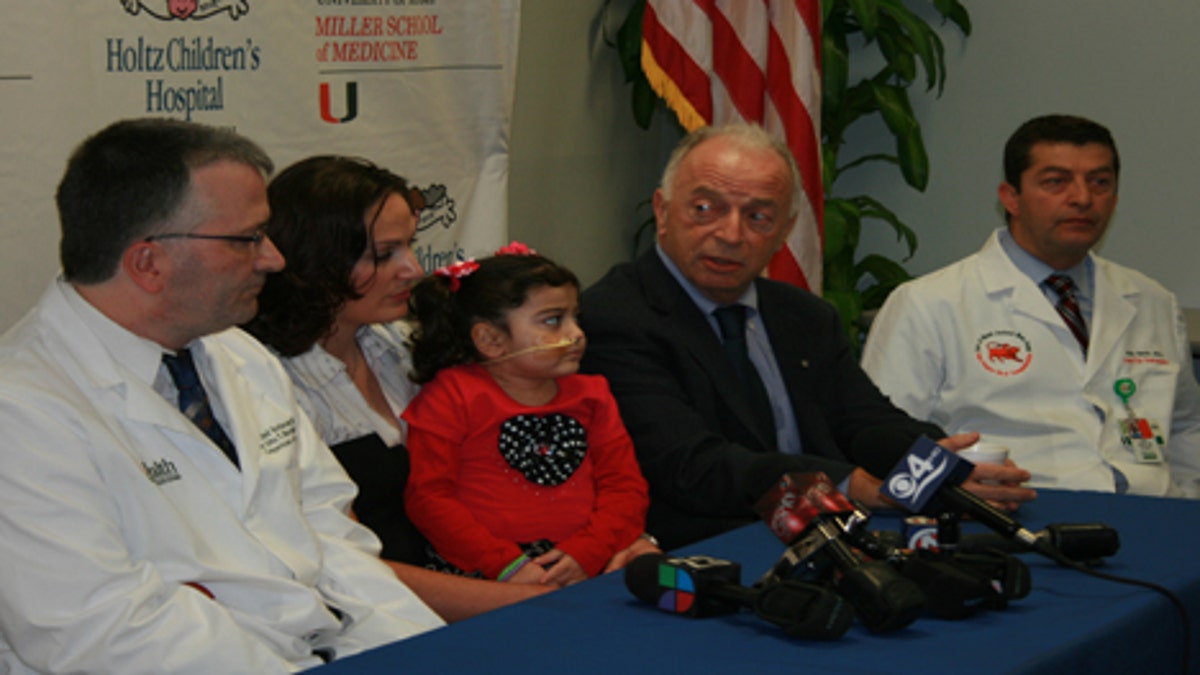
Angela Bushi sits with her mother, along with her surgeon Dr. Andreas Tzakis and the geneticist who diagnosed her, Dr. Olaf Bodamer, as they announce the success of their groundbreaking surgery.
When 6-year-old Angela Bushi’s organs started to fail, her family feared they would lose her – just as they had lost her 18-month-old sister Alicia to liver failure a few months earlier.
“When you see your children in this situation, and there’s nothing you can do, it is so hard,” said Angela’s mom, Valbona Bushi. “We went through a lot.”
But today, Angela’s organs are functioning better than ever. Thanks to a team of geneticists and surgeons at Holtz Children’s Hospital and the University of Miami Miller School of Medicine/Jackson Memorial Hospital, her life was saved after she underwent a combined liver, pancreas, and kidney transplant – the first ever quadruple transplant of its kind performed on a child.
Initially born healthy, Angela developed type 1 diabetes when she was just a year old. Four years later, she became even sicker, developing flu-like symptoms, which eventually turned into fatal liver failure.
“This was kind of an unusual combination of acute liver failure and diabetes,” said Dr. Olaf Bodamer, director of the pediatric genetics program at Holtz Children’s Hospital, who eventually diagnosed Angela. “We knew that her sister had died under similar circumstances, so we assumed that her condition was genetic. When you go to the medical literature, the list of syndromes that came up to explain her condition was very small.”
Bodamer finally discovered the culprit – Wilcott-Rallison Syndrome (WRS), an extremely rare disease with only 60 known cases in medical literature worldwide. Those with WRS have a multitude of health problems, including diabetes, liver and/or kidney failure, bone and growth problems, repeated infections and intellectual impairment.
And for the majority of children with WRS, the condition is typically fatal.
After finally diagnosing Angela with WRS, surgeons knew that if they were going to save her life, transplanting just one organ wasn’t going to cut it.
“The risk to her life was from three (different) organs – the liver, pancreas, and kidneys,” said Dr. Andreas Tzakis, chief of the liver/GI transplant program at UM’s Miller School of Medicine and Jackson Memorial Hospital, and one of the transplant surgeons who operated on Angela. “If there was to be a solution, we knew we’d have to combine these (three different types of) organs into one transplant. We had several consultations within the team, outside the team, and the parents; and collectively, we decided the transplant was the way to go.”
Angela was placed on a transplant list, and on December 29, 2011, she received the ground-breaking quadruple transplant. Because of Angela’s small size and the combination of the organs needed, Angela’s new liver, pancreas, and kidneys all came from a single donor. The organs were left in a “block,” almost as if they were all one organ.
The surgery was the first to ever be performed on a child – and the first to be used to treat WRS. Liver transplants had previously been considered to treat the disease, but surgeons never followed through with them for fear of complications with other organs. But because the surgeons transplanted all the organs at once, the complications were minimized as much as possible.
Initially, Angela started to reject the organs – but the doctors were prepared and treated the issue with anti-rejection meds, and she has since fully recovered. She was discharged from Holtz at the end of February.
Angela no longer needs insulin treatment, and the only evidence of her innovative surgery is a slightly protruding belly, which houses two pancreases, a new liver and four kidneys.
The surgeons hope Angela’s story will not be the only one of its kind and that more transplants like hers can be done in the future.
“The surgery itself might benefit other children who might need this combination,” Tzakis said. “It might give hope to children with this syndrome - that there might be at least one solution that can prolong their life. For the first time, we have a sense of enjoyment about this whole process. Seeing the child looking well and the family being relieved, this is the first time I feel joy for having done this procedure.”
The Bushi family, who live in Jacksonville, Fla., are also joyous to have Angela back home and feeling better. They said they look forward to seeing Angela live a long and healthy life.
“She’s a normal child again, and we can do everything like normal parents,” Valbona said. “She even wants to be a doctor when she grows up.”








































